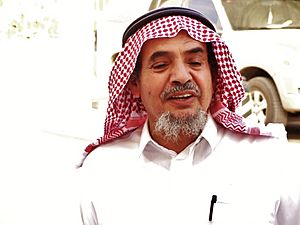Abdullah al-Hamid facts for kids
Quick facts for kids
Abdullah al-Hamid
|
|
|---|---|

Abdullah al-Hamid
|
|
| Born | 12 July 1950 Buraidah
|
| Died | 24 April 2020 (aged 69) Riyadh
|
| Burial place | Riyadh |
| Nationality | Saudi |
| Other names | Abu Bilal |
| Occupation | Political activist |
| Known for | Saudi poet, Arabic professor, human rights activist and a co-founder of the Saudi Civil and Political Rights Association |
| Height | 1,63 |
| Awards | Right Livelihood Award |
Abdullah Hamid Ali al-Hamid (Arabic: عبد الله حامد علي الحامد), also known as Abu Bilal, was an important person in Saudi Arabia. He was a poet and a professor who taught Arabic. He was also a brave human rights activist. This means he worked to protect people's basic rights. He helped start a group called the Saudi Civil and Political Rights Association (ACPRA).
He believed Saudi Arabia should have a "constitutional monarchy." This means the king would still be in charge, but there would also be a constitution (a set of rules) that everyone, including the king, would have to follow. Because he spoke out for these changes, he was put in prison several times.
In May 2005, Dr. Abdullah al-Hamid was sentenced to seven years in prison. This was for "showing dissent" and "disobeying the ruler" after he asked for reforms. However, he was later pardoned and released on August 8, 2005.
In 2008, al-Hamid spent four months in prison. This was for "incitement to protest." He had supported a demonstration by women. These women were protesting because their relatives were being held in prison. The protest happened outside the Buraidah prison in central Saudi Arabia. In 2018, he received the Right Livelihood Award. He shared this award with other activists, including Waleed Abulkhair. They were honored for their brave efforts to improve the political system in Saudi Arabia.
Contents
Legal Challenges in 2012
On September 1, 2012, Abdullah al-Hamid appeared in a special court. He was there with Mohammad al-Qahtani. Both of them read their defense statements to the court. Al-Hamid was accused of trying to cause trouble and question officials. He was also accused of trying to stop the country's progress. If found guilty, he could have faced up to five years in prison. Another co-founder of ACPRA, Mohammed al-Bajadi, had already received a four-year jail sentence for similar charges in April.
Court Decision
On March 9, 2013, al-Hamid was sentenced to five years in prison. He also had to serve six years from an earlier prison term. This earlier term had been pardoned by the King in 2006. An ACPRA member named Abdulaziz Al-Shubaily shared this information. He said the courtroom was full of journalists and activists. There was also a strong security presence. Mohammad al-Qahtani was sentenced to 10 years in the same case. The court also ordered the ACPRA group to be closed. Their money was taken, and their social media accounts were shut down.
Lawyers Faced Difficulties
People who helped al-Hamid also faced challenges. Matrouk al-Faleh was one of his lawyers. He was arrested on May 19, 2008, at his office. He was a professor at King Saud University. He was held without charges for seven months. He was released on January 10, 2009. It is believed his arrest was linked to a letter he wrote. The letter described prison conditions after he visited al-Hamid and his brother.
Another lawyer, Abdulaziz al-Hussan, defended Mohammad al-Qahtani and Abdullah al-Hamid. He was questioned in the spring of 2013. This happened after he posted on Twitter about his clients' prison conditions. To avoid a travel ban, Al-Hussan moved to the United States.
Global Support
On September 7, 2012, Amnesty International spoke out. This group works for human rights around the world. They asked for the charges against al-Hamid and Mohammad al-Qahtani to be dropped. They said the case seemed to be only about their work to defend human rights. They also said it was about their criticism of the authorities. The organization asked people to write letters to the Saudi king and the minister of interior. In 2018, Abdullah al-Hamid was again recognized with the Right Livelihood Award.
His Passing
In January 2020, al-Hamid had high blood pressure. A doctor told him he needed open-heart surgery. But prison officials reportedly told him not to tell his family about his health. They threatened to stop his contact with them.
On April 9, 2020, al-Hamid became unconscious. He was moved to critical care after having a stroke. Amnesty International then asked for his release. Sadly, while still in detention, he passed away on April 24, 2020. He was 69 years old.
See also
- Walid Fitaihi

